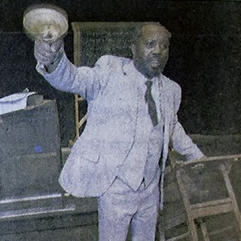From a 1990 Profile in the Seattle Times

“I got into theater because I could not work in South Africa.”
Out of context, that comment by Seth Sibanda seems amusing: another instance of theater-as-the-last-resort. But it is, in fact, the grim conclusion of a horror story in South Africa, from which Sibanda has been exiled for 13 years.
“I was born in Soweto, a township south of Johannesburg,” said Sibanda, who is a member of the cast of “Born in the RSA,” which begins previews Saturday evening at A Contemporary Theatre. “When my father died, my mother, brother and I moved to Alexandra township, which is east of Johannesburg. I finished high school there and applied for a job.”
Sibanda, a soft-spoken man who smiles easily and expresses himself with careful precision, continued his story: “I went to the Alexandra authorities so that my passbook could show I was working. Otherwise, I could get picked up for vagrancy and spend two or more years in prison camp. They said I couldn’t work in Alexandra because I was not born there. They said I should go get a job in Soweto.
“Understand that finding a job and going through all the bureaucratic tangle takes weeks, even months. But I went to Soweto and finally found a job. When I went to the Soweto authorities to get my passbook stamped, they said that because I didn’t live in Soweto, I had to go get a job in Alexandra. It was a Catch-22 nightmare.”
Sibanda then became one of the founders of Workshop ’71 Theatre Company, and that, he said, “saved me, because onstage I was able to vent all my frustrations about South Africa.”
But why did the South African government, which denied him permission to work, allow him and his theater to exist and express themselves freely?
“That’s a very good question,” said Sibanda. “The answer is that the South African government never felt threatened by theater. Sometimes it got disturbed when we performed in the townships, but if we performed in the white areas, the government was very relaxed. They thought we were simply preaching to the converted few. They believed that if whites wanted theater, they’d go to a British farce or an American musical.”
Sibanda noted a vivid example of the South African government’s thinking that “theater doesn’t count”: “When Athol Fugard staged `Sizwe Banzi Is Dead,’ he had to register Winston (Ntshona) and John (Kani) as his gardeners!” (The two black actors collaborated with Fugard in creating the play, and they also performed it, ultimately to great international success.)
In 1977, a professor from Orange County, Calif., saw “Survival,” Workshop ’71 Theatre
Company’s play about prison life, and he invited the four-member cast to the United States.
“We came to Orange County and then performed `Survival’ in various places on the West Coast, primarily at colleges,” said Sibanda. “While we were touring the play in the U.S., it was banned in South Africa. We thought that was peculiar because we had performed the play in South Africa, for all different kinds of audiences, for six months, and nobody in the government said anything. We thought maybe the play was banned because of some of the interviews we were giving in the U.S. We took the banning as a strong hint that we were no longer welcome in South Africa.”
He and his fellow actors applied for political asylum in the U.S.
“It was granted rather quickly,” said Sibanda. “There was a more sympathetic administration then, under Carter.”
Sibanda has managed to stay relatively busy as an actor living in the New York City borough of Queens. He has worked in television and done a number of theatrical productions, including “Poppi Nongena,” for which he received an Obie Award, off-Broadway’s highest honor.
“I definitely miss South Africa,” he said. “I miss it very much. I miss the life in the townships, with friends and family. In America, you can live in a building for eight or nine years and know only three or four people in the building after all that time. But if I go to Soweto, I know everyone right away. We can stop and talk and have a cup of coffee. It’s that daily communal life that I miss. My mother and younger brother are in Soweto. I talk with them on the phone. They say things are going great for them, and they are looking forward to seeing me.”
| Credit Type | Production | Season |
|---|---|---|
| Playwright | Survival | 1989-90 Season |
| Actor | Survival | 1989-90 Season |
| Online Tech | Widows (2021) | 2020-21 Season |

